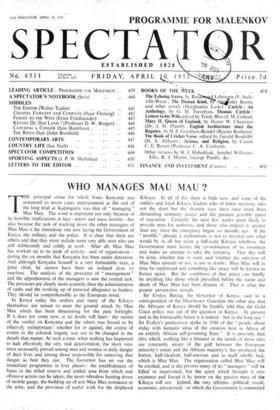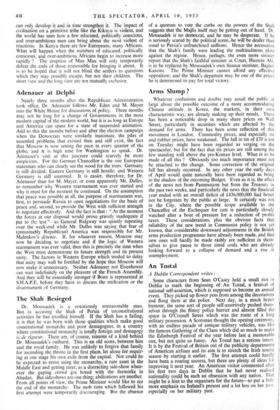WHO MANAGES MAU MAU ?
THE principal crime for which Jomo Kenyatta was sentenced to seven years imprisonment at the end of the long trial at Kapenguria was that of " managing " Mau Mau. The word is important not only because of its horrible implications in fact—terror and mass murder—but also because the task of tracking down the other managers of Mau Mau is the immediate one now facing the Government of Kenya, the military and the police. It is clear that there are others and that they must include some very able men who are still deliberately and coldly at work. After all, Mau Mau has worked up to its peak of activity—and of organisation— during the six months that Kenyatta has been under detention. And although Kenyatta himself is a very formidable man, a great chief, he cannot have been an isolated deus ex machina. The analysis of the processes of " management " and the apprehension of the managers is now the central task. The processes are clearly more scientific than the administration of oaths and the working up of personal allegiance to leaders. They should Joe comprehensible to the European mind.
In Kenya today the settlers and many of the Kikuyu themselves are tensed to meet the general attack by Mau Mau which has been threatening for the past fortnight. If it does not come now, it no doubt will later: the nature of the verdict on Kenyatta and the others was bound to be relatively unimportant: whether for or against, the course of events in the colonial tragedy was not to be changed in the details that matter. At such a time, when nothing has happened to halt effectively the very real deterioration, the Short view must necessarily prevail among men and women in daily danger of their lives and among those responsible for removing that danger as best they can. The Governor has set out the immediate programme in four phases: the establishment of bases in the tribal reserve and settled area from which real offensive action can be taken; the more relentless hunting down of mobile gangs; the building up of anti-Mau Mau resistance in the tribe; and the provision of useful work for the displaced Kikuyu. In all of this there is little new, and some of the settlers and loyal Kikuyu leaders who of bitter necessity take not the short but the shortest view have once more been demanding summary justice and the greatest possible speed of execution. Certainly the next few weeks seem likely to provide tests for authority, and those who respect it. greater than any since the emergency began six months ago. If the " trouble," already a euphemism, is not to develop into what would be in all but name a full-scale Kikuyu rebellion, the Government must hasten the co-ordination of its resources and make an attempt to take the initiative. That this will be done, whether late or soon, and whether the infection of Mau Mau spreads or not, is not in doubt: Mau Mau will in time be suppressed and something like peace will be known in Kenya again. But the conditions of that peace can hardly be anything like those which prevailed before the name and deeds of Mau Mau had been dreamt of. That is what the greater perspective reveals.
Sir Evelyn Baring, the Governor of Kenya, said to a correspondent of the Manchester Guardian the other day that the Africans of Kenya should be frankly told that the Gold Coast policy was out of the question in Kenya. At present and in the foreseeable future it is indeed—but in the long run ? Sir Evelyn's predecessor spoke in 1948 of the " people about today with fantastic ideas of the creation here in Africa of an entirely African self-governing State." It is precisely that idea which, working like a ferment in the minds of those who are constantly aware of the gulf between the European minority's estate and the African majority's, has produced the horror, half-idealism, half-atavism and in itself wholly bad, which is Mau Mau. The organisation called Mau Mau will be crushed, and in the process many of its " managers " will be killed or imprisoned, but the spirit which brought it into existence and forced it by terror on the passive mass of the Kikuyu will not. Indeed, the very reforms—political, social, economic, educational—to which the Government is committed can only develop it and in time strengthen it. The impact of civilisation on a primitive tribe like the Kikuyu is violent, and the world has seen how a few educated, politically conscious, and over-ambitious men can bring about the most violent of reactions. In Kenya there are few Europeans, many Africans. What will happen when the numbers of educated, politically conscious, and over-ambitious Africans begin to increase more rapidly ? The eruption of Mau Mau will only temporarily defeat the ends of those responsible for bringing it about. It is to be hoped that it will not blind the settlers to questions which they may possibly escape, but not their children. The short view and the long view are not mutually exclusive.



































 Previous page
Previous page